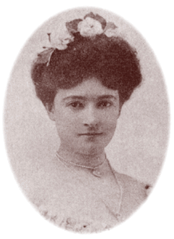
Clara Driscoll, Savior of the Alamo
by Karen Tipton
©1995, Texas Highways
In 1903, Texan Clara Driscoll put up the thousands of dollars necessary to prevent the sale of the Alamo convent to a hotel firm (see"Adina De Zavala, Alamo Crusader"). The gesture earned her the moniker "Savior of the Alamo."
In 1905, the Texas Legislature reimbursed Driscoll. Until then, the mission church which the state had acquired in 1883, was the only Alamo property owned by the state.
Also in 1905, the entire Alamo property was given over to the safekeeping of the Daughters of the Repubic of Texas.
Clara Driscoll was born on April 2, 1881, in St. Mary's, Texas, on Copano Bay, to wealthy ranchers Robert and Julia Fox Driscoll. In 1906, she married editor and publisher Henry Sevier, a representative to the Texas House who later served as ambassador to Chile. (The Seviers divorced in the late 1930s, and Clara took back her maiden name.)
Active and financially generous in civic and political affairs, Clara served as Democratic National Committee-woman from Texas for 16 years and as an officeholder with numerous organizations, including the honorary life presidency of the DRT. In 1943, she deeded her Austin home, Laguna Gloria, to the Texas Fine Arts Association. Today, the building and grounds are home to an art museum and art school. Before her death, she set up the Driscoll Foundation, in memory of her family, to provide a hospital and free clinic for sick and crippled children. The Driscoll Children's Hospital still operates in Corpus Christi.
Clara Driscoll wrote two books, a collection of short stories titled In the Shadow of the Alamo, and a novel. Her comedic opera, Mexicana, had a short run on Broadway in 1905.
Clara Driscoll died on July 17, 1945, in Corpus Christi's Robert Driscoll Hotel, named for her brother. Her body lay in state at the Alamo, with the Lone Star flag at half-staff. She was buried in the family mausoleum in San Antonio's Alamo Masonic Cemetery.